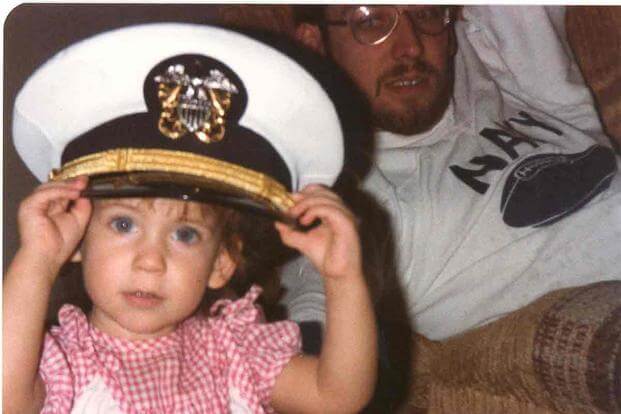Jennifer Barnhill is a columnist for Military.com writing about military families.
Like other underrepresented populations, military spouse history is largely an oral history, in which stories, if not hyperbole, are passed from one spouse to another.
In 100 years, those interested in learning more about our collective experiences will have only a few sources: academic research, military wife (spouse) handbooks written in the mid-1900s, or individual memoirs that capture only slivers of experiences.
There is a small museum dedicated to us in New Mexico, as well as the book "Campfollowing," a 1991 history summarizing the experiences of military spouses from the Revolutionary War through Vietnam in less than 200 pages.
But that's about it. While we should certainly keep passing down our stories, telling the stories of the home front could be an untapped recruiting tool to make the military lifestyle more relatable to the average American. Here are a couple of stories that far more people should know.
The Impact of One Woman
In an era that did not let women or African Americans lead, Chief of Naval Operations (CNO) Adm. Elmo "Bud" Russell Zumwalt Jr. and his wife, Mouza Coutelais-du-Roche Zumwalt, charted a new course for the United States Navy.
Segregation was still common in Virginia in the early 1970s.
"Even in the places of worship … black members were sent to the back rows of the church or up to the balcony," retired Rear Adm. David Oliver, who served as an aide to CNO Zumwalt, wrote in his memoir. "Mouza had heard of this, and was determined to do her own personal sit-ins."
And so Mouza boldly took action, with Oliver's wife Linda in tow.
"Every Wednesday, Mouza would collect Linda, and the two of them would attend services in a different Virginia church," Oliver wrote. "Once inside, they would sit with black parishioners."
Oliver dreaded these sit-ins because a fired-up Mouza would share her experiences with her husband and demand that he press forward with his work to improve race relations within the Navy, leading to a long list of tasks for Oliver.
Mouza's husband was working to improve the Navy in many ways, and he did much of this work by writing more than 120 Navy Instructions called "Z-Grams" to remove what he called "Mickey Mouse" regulations that made the service seem out of touch with younger generations. However, it was Mouza's experiences with systemic bias that fueled her passion for equality and his passion for progress within the Navy.
Mouza Zumwalt was born to a French father and a Russian mother and was raised in Manchuria, having fled what would become the Soviet Union after the 1917 Bolshevik Revolution. She met then-Lt. Zumwalt in Shanghai after the Japanese had surrendered, bringing World War II to a close. "When I first saw Mouza at that dinner party in Shanghai, my heart literally stopped," wrote CNO Zumwalt. He proposed to Mouza, and they were married within five weeks of their first encounter.
However, what drew Zumwalt to his new wife may have had the opposite effect on American women -- especially her peers, the other naval officer spouses. Her accent confused them. Their adherence to Navy customs and traditional courtesies confused her. According to her daughter, Ann, Mouza found belonging in unlikely, if not taboo, friendships with enlisted wives and those who worked for her husband, bucking long-established military traditions and societal norms.
As she pressed her husband to reform the Navy, she found a partner who was open to making hard choices.
"He regarded his most current job as though it was going to be the last job he ever had," recalled Ann Zumwalt, the third of the four Zumwalt children. "By doing so, he could then make controversial decisions and not worry about it."
Despite her significant impact on the Navy, Mouza Zumwalt's name is not well known, even within the naval community. Mouza's story, like the previously buried stories of Katherine Johnson, Mary Jackson and Dorothy Vaughan of NASA and "Hidden Figures" fame, has gone untold, just waiting for someone to share it with a broader audience.
There is one organization that is tracking Mouza Zumwalt and other historic spouses, the Naval Services FamilyLine (NSFL), a nonprofit founded by Navy spouses in 1965 to provide information and resources to Navy and Marine Corps families.
"Through her own frustrations, [Mouza Zumwalt] advocated for other wives and their families and from her own experiences came the creation of the ombudsman program which the Navy still relies upon today," said Meg Graves, the historian for NSFL. "NSFL has amassed a collection of 12 boxes of letters, trainings, how-to guides and official communications, documenting the powerful and longstanding role of military spouses."
Without proper digitization, these historical documents could be lost, and a fuller picture of Zumwalt's life may never be shared with Americans who should know about Mouza's contributions and her husband's.
How Culture Impacts Our Military Stories
Anita Pearson's military spouse story is at the crossroads of many broader shifts in America. As a Black woman who came of age in South Carolina in the 1960s, she was immersed in the Civil Rights movement, while she was also pulled into the war in Vietnam because of her marriage to a young Army officer. In the '60s, the entire nation felt the consequences of the war due to the draft. As a result, Pearson's experiences were instantly familiar to those already closest to her, her childhood friends.
"There were a number of us 'home' girls who decided to return home that year since our husbands were in Vietnam," said Pearson. "We got this big map of Vietnam, and we learned where each of our husbands were going to be stationed. And we got pushpins in different colors to represent their locations. And each of us kind of kept track of what was happening in terms of the war and each of those areas."
Thankfully, the husbands of all her 'home' girls returned. But many of the battles that originated in Vietnam continued on the home front. "We had a number of persons from home who we lost and then some became ill to addiction," she said.
She, like all Americans, knows that not all battles end on the battlefield. What many are less familiar with is the impact family service has on military spouses, like Pearson.
Pearson's military spouse journey is very similar to the experiences of younger generations, even if the nation no longer has the same connection to the military.
"He got orders for Germany, and it was a challenge for me because I had just gotten a master's in speech pathology and I needed to work under the auspices of someone with that [degree] and that was just an impossibility," said Pearson. "But it was OK. I loved the experience."
Despite an initial professional setback, she persisted, as military spouses do, and made the best of her situation, soaking in cultural experiences, learning the language and ultimately carving out a professional role at the installation to find personal and professional fulfillment.
Although her desire to work mirrors a modern military spouse's experience, it was not the norm for others within her community at that time. "Most of the Black wives worked, and I guess it was just, you know, our expectation," recalled Pearson. "And that wasn't necessarily true, you know, as a cultural thing [for the white wives]."
Her working status and race stood out within a predominantly white community.
"I will never forget that I had gone to a tea, and the general's wife introduced me as 'our one who works.'"
But like Mouza Zumwalt, these negative experiences did not impact her view of being a military spouse or military service. Pearson's daughter followed in her father's footsteps and serves as a major in the Army.

The Impact of One Story
I grew up in the '80s in New Jersey next to a base that was dying before my eyes as a result of a string of military downsizing decisions. Despite being right next to a floundering installation that should have fed into my community, I knew only one military family before I met and later married my husband. My childhood best friend had been a Navy brat before our families met. And her mom, "Mrs. (Melissa) Picchini," had feelings about her time as a military spouse. So shortly after I started dating a man who took me to the Naval Academy Chapel on our first date, I sat down with Mrs. Picchini to decide whether the military lifestyle was something I wanted to factor into my future.
She said something to the effect of, "If he's in the Navy, you can't assume he's going to get out in four years and you'll get your life back. If you say yes, you marry the Navy too."
Her words stuck with me and helped me cope with my decision to marry the military over the years.
"When Alyssa [my bestie] was due, Renny's ship was doing workups to go do a big cruise," recalled Picchini. "I said, see if you can take leave for a week because I'm going to go into labor. And the end CO was absolutely, absolutely there was no way he was going to give him any time off. And I was like, 'OK, I'm gonna have this baby by myself.''
And she did. Her husband was at sea for eight months, during which she heard his voice only twice.
"When I married him, I accepted that this might be my lifestyle. So it was not assumed that he would get out because I thought he should get out," said Picchini. "I did feel it was an honor to be a wife of someone like him who was [a leader on] a ship, you know, who was good at what he did, who people looked up to and who had a mission that I believed in. That was important to me. So I said to him, 'If you [don't] want to get out, we're done having kids because I'll be a single mom.'"
Ultimately, Renny Picchini got out of the Navy after nine years because of the impact the lifestyle had on his family. Of course, the family had amazing experiences too -- namely, military friendships that are still flourishing to this day. But it was the story of my friend not recognizing her dad when he came home from a deployment that I remembered. And it was this singular oral history that made me hesitate to say yes to a man I loved because he wore a uniform.
Today, I write stories about military families because I did not see myself reflected in the stories previously told. My sincerest hope is that by telling our diverse stories, someone will see themselves long enough to want to stay.












